
National Center For Equine Facilitated Therapy (NCEFT)
880 Runnymede Road
WOODSIDE, CA 94062
Mailing Address:
880 Runnymede Rd
WOODSIDE, CA 94062
Phone: 650-851-2271
MAKE AN INQUIRY
View our WEBSITE
EIN: 94-2378104Founded: 1971
View our PHOTO GALLERY
Profile Last Updated December 2, 2025Public Charity
Click here to view listing(s) of the program horses we are seeking

The Guardian Seal of Transparency is awarded annually to recognize an organization's commitment to transparency and accountability by their willingness to make comprehensive data about their programs, horse care practices, and governance available for public scrutiny. The Guardian Seal of Transparency is NOT an endorsement.
Last Updated: November 30, 2025
National Center For Equine Facilitated Therapy (NCEFT) has not attained the Guardian designation for 2026.
MISSION & PROGRAMS
Mission:Mission Statement: NCEFT is dedicated to helping children, adults, and military Veterans with special needs reach beyond boundaries through equine-assisted therapies, education, and research.
Our organization conducts Equine Assisted Services in accordance with the EQUUS Foundation Guidelines on Qualifications of Organizations Conducting Equine Assisted Services (EAS).
Our organization does not provide outreach and/or public education programs involving horses.
100% of our total programs and services are equine-related.
Our organization is directly responsible for the care and shelter of equines involved in our programs.
Our organization does not CURRENTLY use satellite, overflow, foster, and/or outreach facilities.
Please describe what steps your organization takes to ensure that:
1) all interactions between your equines and people are mutually beneficial and conducted in accordance with the Guidelines for Human-Equine Interactions stated below;
2) all equines in the care of our organization and/or equines that participate in the organization's program have access to clean drinking water at all times; nutritious food in sufficient quantity, including natural forage such as pasture grass and/or hay; appropriate veterinary, farrier, and dental care; shelter and protection from the weather; sufficient safe space to move around comfortably on a daily basis; and daily opportunity to freely interact and have contact with other equines:
NCEFT as an organization respects our equines as partners and teammates. They are an integral part of our programs and without them, the incredible accomplishments of our clients would not be possible. Each NCEFT staff member, regardless of their role in the organization, is trained in the proper care and handling of horses, this includes an understanding of general horse behavior and the individual horses’ personalities, sensitivities and quirks. The NCEFT Barn Staff are intimately familiar with our horses and have great depth of knowledge about each animal and situations for which they are best suited, and those situations may stress the equine partner. Barn Staff is consulted on which horse(s) may be the best choices for any given program.
All NCEFT programs are designed with the health and welfare of the horses in mind. Program plans are reviewed with the Barn Staff to ensure no horse is in a situation that may cause them to be uncomfortable or stressed. A Barn Staff member (our equine experts) is directly involved in each program. This enables the Barn Staff to closely monitor the horses and remove them from the situation if necessary.
NCEFT are afforded excellent care. Each horse has access to clean water in water troughs and automatic waters in their stalls and can drink freely 24 hours per day. Hay is fed twice daily; the type of hay a horse gets depends on their needs and the recommendation of our veterinarian (Orchard Grass Hay, Teff Hay and/or Alfalfa). Grain is fed mid-day with medications and supplements as required for the individual horse.
Veterinary care is retained as needed for medical attention, lameness exam, allergies, and other ailments. Vaccines are given twice annually. Horses are shod or trimmed every 6 weeks. Each horse has a routine dental annually, at a minimum.
Each horse has their own stall/paddock with plenty of space to move around throughout the day. The horses enjoy interacting with their neighbors and watching activity around the barn.
One of our tenets for managing an older herd is to get each horse exercised, at the level appropriate for the individual horse, on a daily basis. We are fortunate to have many options for exercising our horses, hand walker, hot walker, round pen work, lunging, two arenas for riding, and easy trail access. The Barn Staff is chartered with determining what will be most beneficial for each horse on a given day.
On days we do not have sessions (weekends and holidays), horses are turned out in large turnouts for two hours each day.
Equine Assisted Services (EAS) Overview:
Overview of our programs involved with providing EAS to individuals with special needs:
Founded with a vision to provide hope and healing to children and adults with disabilities and mental health challenges, NCEFT combines evidence-based practices with the power of the human-horse connection to deliver a comprehensive range of programs. NCEFT's team of skilled professionals, including licensed therapists, certified instructors, and compassionate volunteers, work together to create a safe and supportive environment for participants. Established in 1971, NCEFT has made a positive impact on the lives of countless individuals and their families for nearly 54 years.
Typical client diagnoses we treat include, but are not limited to, cerebral palsy, multiple sclerosis, Down syndrome, autism, developmental delay, traumatic brain injury, genetic disorders, ADHD, and learning or language disabilities, trauma, PTSD, anxiety, depression, social isolation, grief, and loss.
Our programs include:
Hippotherapy programs:
- Physical and Occupational Therapy incorporating a horse’s dynamic movement
Mental Health and Resilience programs:
- Individual and group services for children, adolescents, and adults with mental health challenges or chronic illness.
- Specialized programs for US military veterans and first responders.
- Community Outreach programs as part of our commitment to serving additional diverse and underserved populations.
- Resilience retreats to promote stress relief and enhance communication and team building.
- Resilience camps for youth.
Adaptive Riding and Horsemanship programs:
- Adaptive Riding (riding and horsemanship adapted for each client’s ability and goals)
- Horsemanship Academy (ground-based horsemanship skills and education)
- Happy Trails Camp (horse camp for youth with disabilities)
- School Programs (field trip opportunities/outdoor education and adaptive horseback riding for youth).
To further promote health equality, NCEFT provides financial assistance to those who qualify to ensure access to quality services regardless of socio-economic status. Additionally, we provide services free of charge to U.S. military veterans and first responders. In total, NCEFT provides financial assistance to over 30% of its clientele.
NCEFT’s breadth and depth of programming, tenure, and history of pioneering equine-assisted programs in the United States distinguishes itself from other similar organizations in the area. NCEFT adheres to the highest standards of professionalism, safety, licensing, accreditation, and fiscal integrity. NCEFT holds Platinum status with Candid/Guidestar.org and a 5-Star rating with GreatNonProfits.org. Additionally, NCEFT has Guardian status with EQUUS Foundation, and we have the distinction of being the only Northern California Facility member of the American Hippotherapy Association.
Equine Assisted Services (EAS) and Providers:
Our organization provides the following Equine Assisted Services (EAS):
Adaptive/Therapeutic Riding
Adaptive/Therapeutic Unmounted Horsemanship
Psychotherapy/Counseling
Occupational Therapy/Physical Therapy/Speech-Language Pathology
9: Total number of Equine Assisted Service Providers at National Center for Equine Facilitated Therapy
1 Anna Lee, Adaptive Riding Instructor, PATH Certified
FACILITY PARTICIPATION:
National Center for Equine Facilitated Therapy
RELATIONSHIP: Employee
SERVICES PROVIDED:
Adaptive/Therapeutic Riding
Adaptive/Therapeutic Unmounted Horsemanship
DEGREES, LICENSES AND/OR CERTIFICATIONS
Anna holds a PhD in Environmental Sciences and has been a PATH-Certified Adaptive Riding Instructor at NCEFT since 2015. She learned to ride in Portola Valley and began volunteering in adaptive riding sessions when she was in high school. Anna enjoys baking, playing the viola, and long-distance trail running.
2 Annette Angulo, LMFT, Therapist, Mental Health & Resilience
FACILITY PARTICIPATION:
National Center for Equine Facilitated Therapy
RELATIONSHIP: Independent Contractor
SERVICES PROVIDED:
Psychotherapy/Counseling
DEGREES, LICENSES AND/OR CERTIFICATIONS
Annette is a licensed mental health therapist with 15 years of experience working with mostly Spanish speaking families who have undergone trauma in their lives. She has always been passionate about all animals and volunteered at the Equine Center while an undergrad at UC Davis as well as working as a side-walker at an equine therapy facility in Southern California.
3 Briana Carr, PsyD, Director of Mental Health & Resilience
FACILITY PARTICIPATION:
National Center for Equine Facilitated Therapy
RELATIONSHIP: Employee
SERVICES PROVIDED:
Psychotherapy/Counseling
DEGREES, LICENSES AND/OR CERTIFICATIONS
Briana holds a PsyD in Clinical Psychology from Alliant International University. She previously worked as a staff Psychologist in the Dept of Psychiatry at Kaiser Permanente providing psychotherapy to adults, youth, and families. Her love for horses led her to pursue a career at NCEFT where she could connect people to the powerful experience of utilizing horses with mental health services.
4 Chris Swan, PT & Program Director
FACILITY PARTICIPATION:
National Center for Equine Facilitated Therapy
RELATIONSHIP: Employee
SERVICES PROVIDED:
Occupational Therapy/Physical Therapy/Speech-Language Pathology
DEGREES, LICENSES AND/OR CERTIFICATIONS
Chris Swan, NCEFT Program Director, MSPT, ATC, HPCS
Chris has been with NCEFT since September 2007. Chris graduated with a BS in health education and athletic training before attaining her MS in physical therapy. In 1996, Chris trained with one of the pioneers of the treatment strategy of hippotherapy in the US, Barbara Heine, before going on to volunteer at NCEFT as a side walker and working as a per diem PT in 1998 and 1999. After that, Chris worked in out-patient orthopedic and home health settings before returning to NCEFT in 2007 and attaining her clinical specialist certification in 2010. Chris is mom to three boys, and she enjoys activities such as photography, kickboxing classes, hiking, dancing, jewelry making, and drawing. Chris loves her work at NCEFT because it represents a never-ending puzzle for her to solve and because she loves the interactions with patients who, although they are working hard, enjoy her playful and encouraging approach to their therapy.
5 Erin Colahan, PT, DPT, Physical Therapist
FACILITY PARTICIPATION:
National Center for Equine Facilitated Therapy
RELATIONSHIP: Employee
SERVICES PROVIDED:
Occupational Therapy/Physical Therapy/Speech-Language Pathology
DEGREES, LICENSES AND/OR CERTIFICATIONS
Erin holds a Doctorate in Physical Therapy from Ithaca College. Erin comes with experience working in the outpatient, subacute and skilled nursing rehabilitation settings. Her love for horses started as a child when she learned how to vault, and she currently enjoys taking horseback riding lessons in Los Gatos.
6 Matthew Gridley, Adaptive Riding Instructor, Path Certified
FACILITY PARTICIPATION:
National Center for Equine Facilitated Therapy
RELATIONSHIP: Employee
SERVICES PROVIDED:
Adaptive/Therapeutic Riding
Adaptive/Therapeutic Unmounted Horsemanship
DEGREES, LICENSES AND/OR CERTIFICATIONS
Matt has a background in equestrian sports and has worked as an Exercise Rider and Barn Manager for several international show jumping barns. He joined NCEFT in December 2019 and holds credentials as a Certified Therapeutic Riding Instructor and Equine Specialist in Mental Health and Learning through PATH International. He finds great joy in helping to foster the special bonds between horses and humans. In addition to his equestrian experience, Matt is trained as a Wilderness First Responder and enjoys backpacking.
7 Sarah Peters, AMFT, Mental Health & Resilience Therapist
FACILITY PARTICIPATION:
National Center for Equine Facilitated Therapy
RELATIONSHIP: Employee
SERVICES PROVIDED:
Psychotherapy/Counseling
DEGREES, LICENSES AND/OR CERTIFICATIONS
Sarah is an Associate Marriage and Family Therapist who holds an M.A. in Counseling Psychology from Pacifica Graduate Institute. She grew up riding horses in Virginia, and previously led acute psychiatric crisis stabilization and residential dual diagnosis programs in San Francisco. She joined NCEFT in September 2023 to unite her abiding love of horses with her passion for serving people seeking change in their lives.
8 Tatyana Chack, Path Certified
FACILITY PARTICIPATION:
National Center for Equine Facilitated Therapy
RELATIONSHIP: Employee
SERVICES PROVIDED:
Adaptive/Therapeutic Riding
Adaptive/Therapeutic Unmounted Horsemanship
DEGREES, LICENSES AND/OR CERTIFICATIONS
Tatyana graduated from Cal Poly SLO with a BS in Animal Science and an emphasis in Equine Studies. She is currently enrolled in Santa Clara University’s Masters Program in Counseling Psychology and will attain a LPCC license. Tatyana has equine management experience and is a PATH certified AR instructor. In her spare time, Tatyana enjoys gardening, spoiling her dogs, and furthering her equine education.
9 Wendy Lucas, OTR/L, Occupational Therapist
FACILITY PARTICIPATION:
National Center for Equine Facilitated Therapy
RELATIONSHIP: Employee
SERVICES PROVIDED:
Occupational Therapy/Physical Therapy/Speech-Language Pathology
DEGREES, LICENSES AND/OR CERTIFICATIONS
Wendy joined NCEFT in April 2022. She received her MS in Occupational Therapy from San Jose State University in 2018. Wendy comes from a school-based OT background. Her love of animals, outdoors, and working with people of all ages led her to NCEFT.
Research/Medical Use of Equines:
Our organization has never made, and would not ever consider making, equines available for research studies or medical training that involves invasive procedures and/or that which may cause pain or suffering to the equine.
Religious Affiliation:
Our organization does not promote religious education, religious purposes, or a specific religious faith or use donations for religious education or religious purposes; require participants to be of a certain faith; require participation in religious, instruction, activities or services; or require participation in prayer, worship, religious instruction or other religious activities as a condition of receiving social or secular services offered.
Auction Donation:
Our organization has never allowed, or would not consider allowing, an equine to be sold, transferred, released, or otherwise placed into possession of any person or organization that would cause or allow the equine to be sold at auction for slaughter.
POLICIES: INTAKE, ASSESSMENT & TRAINING
Prior to a horse being accepted and/or arriving at the facility, the organization has the following policies in place:The owner of a potential equine is interviewed over the phone or in person prior to seeing the equine
The equine is evaluated at its place of residence
The owner completes an application/contract which constitutes the agreement between the owner and our organization when the equine is acquired from the equine's owner other than by seizure or by abandonment
If health records are not available or are out-of-date, our veterinarian will administer appropriate vaccinations
A health certificate signed by a veterinarian and dated no more than seven days prior to arrival is provided to our organization either prior to or upon arrival of the equine attesting to the health status of the equine
The owner is financially responsible for the shipping of the equine to and from the organization
Trial Period: Check all that apply:
Equines are on trial up to 60 days
The trial period may be reduced based on the equine's progress
During the trial period, the organization accepts total financial responsibility for the care of the equine, including board, feed, shoeing and any necessary veterinary care
The trial period may be terminated by either the organization or the owner for any reason
Equines are on trial for up to 30 days
Equines are on trial for 60 or more days
During the trial period, the organization accepts financial responsibility for the care of the equine, including board, feed, shoeing and any necessary veterinary care, up to a fixed amount agreed upon by the organization and the owner
During the trial period, the owner/donor is financially responsible for the care of the equine, including board, feed, shoeing and any necessary veterinary care
Upon intake, the organization has the following quarantine policy in place:
The equine is confined to a designated and separate area for isolation and quarantine at the facility for a prescribed period of time
The equine is confined to a designated and separate area for isolation and quarantine off-site for a prescribed period of time
The equine is not quarantined
The typical length of quarantine is: 20 to 30 days
Following arrival of the equine at the facility, the following is performed:
Physical examination to include temperature, pulse and respiration by a veterinarian upon arrival
Physical examination to include temperature, pulse and respiration by a trained staff member upon arrival
A Henneke Body Conditioning Score or other body conditioning score is assigned by a veterinarian upon arrival
Photographs are taken of each equine upon arrival at the facility and kept with the equine's health records
Physical examination by a farrier
Physical examination by a dentist
The equine is microchipped if the equine has not been microchipped
A Henneke Body Conditioning Score or other body conditioning score is assigned by a trained staff member upon arrival
Horses are assessed for following skills and behaviors:
Retrieval from a pasture/paddock
Leading with a halter and lead rope
Temperament, disposition and attitude, such as rated from very calm to very high spirited
Saddling
Bridling
Lunging
Loading onto and unloading off a trailer
Mounting and dismounting
Riding at the walk
Riding at the trot
Riding at the canter
Riding by a beginner and/or unbalanced rider
Tolerance to unusual objects and loud noises
Known vices, i.e., cribbing, biting, kicking, weaving, stall walking, etc
Grooming
Bathing
Clipping
Tolerance to multiple handlers at the same time
Jumping
Driving (Pulling a carriage)
Our organization has the following policies and procedures in place pertaining to the ongoing assessment of horses in its care:
Physical examination by a veterinarian at least annually
The Henneke Body Condition score or other body conditioning score is updated at least annually by the veterinarian
Vaccinations are administered at least annually
Equines at our facility may be treated by an equine chiropractor
Equines at our facility may be treated by an equine acupuncturist
Equines at our facility may be treated by an equine massage therapist
Equines at our facility may be treated by an equine nutritionist
The Henneke Body Condition score or other body conditioning score is updated at least annually by a trained staff member
Photographs are taken of each equine monthly and kept with the equine's health records
Photographs are taken of each equine annually and kept with the equine's health records
Our organization has the following policies and procedures in place pertaining to the weight-carrying or workload capabilities of horses/equines that are ridden in our care:
Our organization evaluates the weight-carrying and workload limitations for each equine that is ridden at least annually
Our organization maintains a written record of the weight-carrying and workload limitations for each equine that is ridden
Our organization does not evaluate the weight-carrying and workload limitations for each equine that is ridden
No equines are ridden; not applicable
The following variables are considered in determining the weight-carrying and workload limitations for each equine that is ridden:
Equine age, weight, breed, body condition, fitness, balance, health and soundness
Equine conformation to include the top line, length of back, strength and width of loin, bone density (measured by the circumference of the cannon bone just below the knee)
Size, shape, condition and angle of the hooves
Participant weight, height, body proportions, balance, fitness and riding skills as well as behavioral issues and safety concerns
Weight and proper fit of the saddle and other equipment
Terrain and footing in the working environment
Duration and frequency of working sessions, as the frequency with which an equine is subjected to maximum weight carrying and/or workload
Nature and pace of work, repetitive or varied, radius of turns, degree of incline and regularity of footing when equine is subject to maximum weight-carrying capacity
Temperature and/or weather conditions
Seasonal impact on the equines' workload and weight-carrying capabilities and limitations
Our organization does not evaluate the weight-carrying and workload limitations for each equine that is ridden
No equines are ridden; not applicable
Horses provided formal training (groundwork or riding): 2-3 times per week
Additional information about our intake, assessment & training policies and practices:
We require owner verification that the equine is healthy, vaccinations are up to date, and temperature taken prior to a horse being brought onto our property. Horses are then isolated for 15 days, while temperature is monitored.
POLICIES: BREEDING
The organization has the following policies related to breeding and stallions:Our organization does not conduct breeding of equines owned or under the care of our organization.
Our main facility where our organization conducts its programs does NOT breed equines.
One or more of the facilities where our organization conducts its programs, including foster/temporary care facilities, breeds equines
One or more of the facilities where our organization conducts its programs, including foster/temporary care facilities, are permitted to house stallions
POLICIES: EUTHANASIA
The organization has the following policies related to euthanasia:Our organization will never have an equine euthanized for space
Our organization will have an equine euthanized upon the recommendation of the veterinarian if the equine is a threat to itself, other equines, or people
Our organization will have an equine euthanized upon the recommendation of the veterinarian after all reasonable treatment options have been explored
Euthanasia is done on site when possible to decrease trauma from transport
Disposal of the carcass is handled within 24 hours
Our organization will never have an equine euthanized under any circumstances
Euthanasia is done at the veterinarian's facility
The following are authorized to administer the procedure for your organization in accordance with state laws:
Veterinarian
A certified euthanasia technician
Senior staff with appropriate training
Employee of animal control shelter or humane society with appropriate training
Veterinary student under the supervision of a licensed veterinarian
Not applicable. Our organization prohibits euthanasia under any circumstances
POLICIES: RE-HOMING
View Re-homing AgreementOur organization has the following re-homing (adoption/purchase) policies and procedures in place:
All potential adopters/purchasers complete a written contract which constitutes the agreement between our organization and the new owner
Potential adopters/purchasers must visit our organization and be observed with the equine on site
Our organization conducts a site visit of the adopter/purchaser's facility before the transfer of the equine to the adopter/purchaser's facility
Adopters/purchasers are NOT required to provide updates
Our organization does NOT re-home an equine to first time equine owners
Our organization will only re-home an equine to a location where another equine resides
The distance of a potential adopter/purchaser's home from our facility is a consideration for when re-homing an equine
Potential adopters/purchasers are encouraged to do a short-term, on-site foster with the equine
Our organization has the following policies and procedures related to horses that need to be retired, are no longer able to contribute to the mission of the organization, and/or are no longer manageable:
Equines may remain at our organization for their lifetimes
Equines may be found suitable homes by our organization
Equines may be returned to their owners
In the case an equine is unmanageable and demonstrates repeated dangerous behaviors, the equine may be euthanized upon the recommendation of the veterinarian
In the case an equine is unsound and/or unhealthy and cannot be treated to relieve suffering, the equine may be euthanized upon the recommendation of the veterinarian
The organization will accept financial responsibility for equines in the current care of the organization that need to be retired or are no longer able to contribute to the mission of the organization if all alternatives have been explored to find the equine an appropriate placement and space is not available for the equine to remain at the organization.
Equines may be sent to auction
If a suitable home cannot be located within 12 months, the equine may be euthanized
The uploaded Re-homing agreement includes the following re-homing (adoption/purchase) statements:
The agreement reflects that any individual or organization in possession of the equine as of the date of the agreement and any time thereafter is bound to not sell the equine at auction for slaughter or allow the equine to be sold, transferred, released, or otherwise placed into possession of any person or organization that will cause or allow the equine to be sold at auction for slaughter.
The agreement states that should the adopter decide to re-home the equine, the adopter must grant the organization first right of refusal prior to the equine being placed into the possession of any individual or organization intending to take possession of the equine for any reason.
The agreement states that should the adopter decide to re-home the equine, our organization must be notified of the name, address, and telephone number of any individual or organization intending to take possession of the equine for any reason prior to the equine being placed into the possession of such individual or organization.
The agreement states that should the adopter decide to re-home the equine, our organization must grant approval of any individual or organization intending to take possession of the equine for any reason prior to the equine being placed into the possession of such individual or organization, including being provided written notification of the name, address, and telephone number of any individual or organization intending to take possession of the equine for any reason.
The agreement states that the terms of our organization's agreement will be binding on any future individual or organization taking and/or in possession of the equine for any reason.
The agreement states that if there is any breach of contract the equine must be returned to our organization
The agreement states that our organization reserves the right to make scheduled visits
Our organization microchips all equines that are not already microchipped before the adoption and/or transfer of the equine if the organization has the authority to microchip the equine.
The agreement includes the microchip number of the equine.
The agreement states that the re-homed equine CANNOT be sold, adopted, transferred, auctioned, released, given away, or otherwise placed into the possession of another individual or organization under any circumstances and must be returned to our organization should the adopter decide that he/she is no longer able, or no longer wishes, to care for the equine.
The agreement states that re-homed equines cannot be bred
The agreement states that our organization reserves the right to make unannounced visits
The agreement states that adopters/purchasers can return an equine to our organization free of charge
The agreement states that adopters/purchasers can return an equine to our organization for a fee
The agreement states that adopters/purchasers are required to provide updates (photos, vet records) for one year
The agreement states that adopters/purchasers are required to provide updates (photos, vet records) for two years
The agreement states that adopters/purchasers are required to provide updates (photos, vet records) for as long as the adopter/purchaser is responsible for the care of the equine
None of the statements are included.
The organization does not re-home equines under any circumstances; our organization retains custody of our equines and ensures care of the equines for their lifetimes.
Our organization does not have the authority to transfer ownership and/or does not own any of the equines involved with our programs.
Our organization requires references from the following:
Veterinarian
Farrier
Personal/Other
Not applicable or no references required.
Transfer of ownership occurs: Immediately (at the time of adoption/purchase) or less than one year
The average equine re-homing (adoption/purchase) fee received by your organization:
Over $1,500
EQUINE CARE & SHELTER/FACILITY INFORMATION
Our organization does not CURRENTLY use satellite, overflow, foster, and/or outreach facilities.Total facilities at which our organization cares for and shelters horses used in our programs: 1
National Center for Equine Facilitated Therapy
880 Runnymede Road Woodside CA 94062
Currently operational
Total number of horses/equines currently involved with your programs, under your care, and/or owned by your organization at this facility: 16
Total number of horses at this facility NOT INCLUDING those counted above: 17
Maximum capacity of horses at this facility: 40
Does your organization own, lease or use a part of this facility? Own
Provide the contact information for the individual or organization responsible for investigating abuse in the county where the facility is located, including mailing address, email address, and phone information.
The 20 cities and towns in San Mateo County contract with the County to operate a countywide animal control program. San Mateo County Animal Control & Licensing, 225 37th Avenue, San Mateo, CA 94403. Program manager: (650) 573-3726. The County contracts with the Peninsula Humane Society & SPCA (PHS), a private non-profit organization, to enforce all animal control laws, shelter homeless animals, and provide a variety of other services. Services provided by the PHS, 12 Airport Boulevard, San Mateo, CA 94401; 1450 Rollins Road, Burlingame, CA 94010, (650) 340-8200
Does your organization conduct Equine Assisted Services (EAS) at this facility in accordance with the EQUUS Foundation Guidelines on Qualifications of Organizations Conducting Equine Assisted Services (EAS)? Yes
Total number of Equine Assisted Service Providers AT THIS FACILITY, including instructors, specialists, therapists, counselors, coaches and/or facilitators (full-time, part-time, volunteer, independent contractors, and/or providers accompanying clients) that conduct Equine Assisted Services (EAS) in accordance with the EQUUS Foundation Guidelines on Qualifications of Organizations Conducting Equine Assisted Services (EAS) AT THIS FACILITY: 9
Equine Assisted Service Providers Assigned to this Facility: (see Equine Assisted Service Provider Section below for details)
1. Anna Lee, Adaptive Riding Instructor, PATH Certified
2. Annette Angulo, LMFT, Therapist, Mental Health & Resilience
3. Briana Carr, PsyD, Director of Mental Health & Resilience
4. Chris Swan, PT & Program Director
5. Erin Colahan, PT, DPT, Physical Therapist
6. Matthew Gridley, Adaptive Riding Instructor, Path Certified
7. Sarah Peters, AMFT, Mental Health & Resilience Therapist
8. Tatyana Chack, Path Certified
9. Wendy Lucas, OTR/L, Occupational Therapist
Veterinarian Information: National Center for Equine Facilitated Therapy (*Main) Currently operational
Veterinarian: Alicia Yocum DVM or Julia Petersen DVM
Clinic Name: Bayhill Equine (Pls contact Alicia for the Vet Assessment)
123 Belmont Avenue
Redwood City CA 94061
Phone: 650-851-2300
Grounds: National Center for Equine Facilitated Therapy (*Main) Currently operational
Total acreage dedicated specifically to the horses: 12
Our organization has use of the following at this facility:
Structures/Barns: 10 Run-in sheds: 0
Pastures: 5 Paddocks/Pens/Turnout Areas: 31
Uncovered Outdoor Rings: 1 Covered Outdoor Rings: 1 Indoor Rings: 0
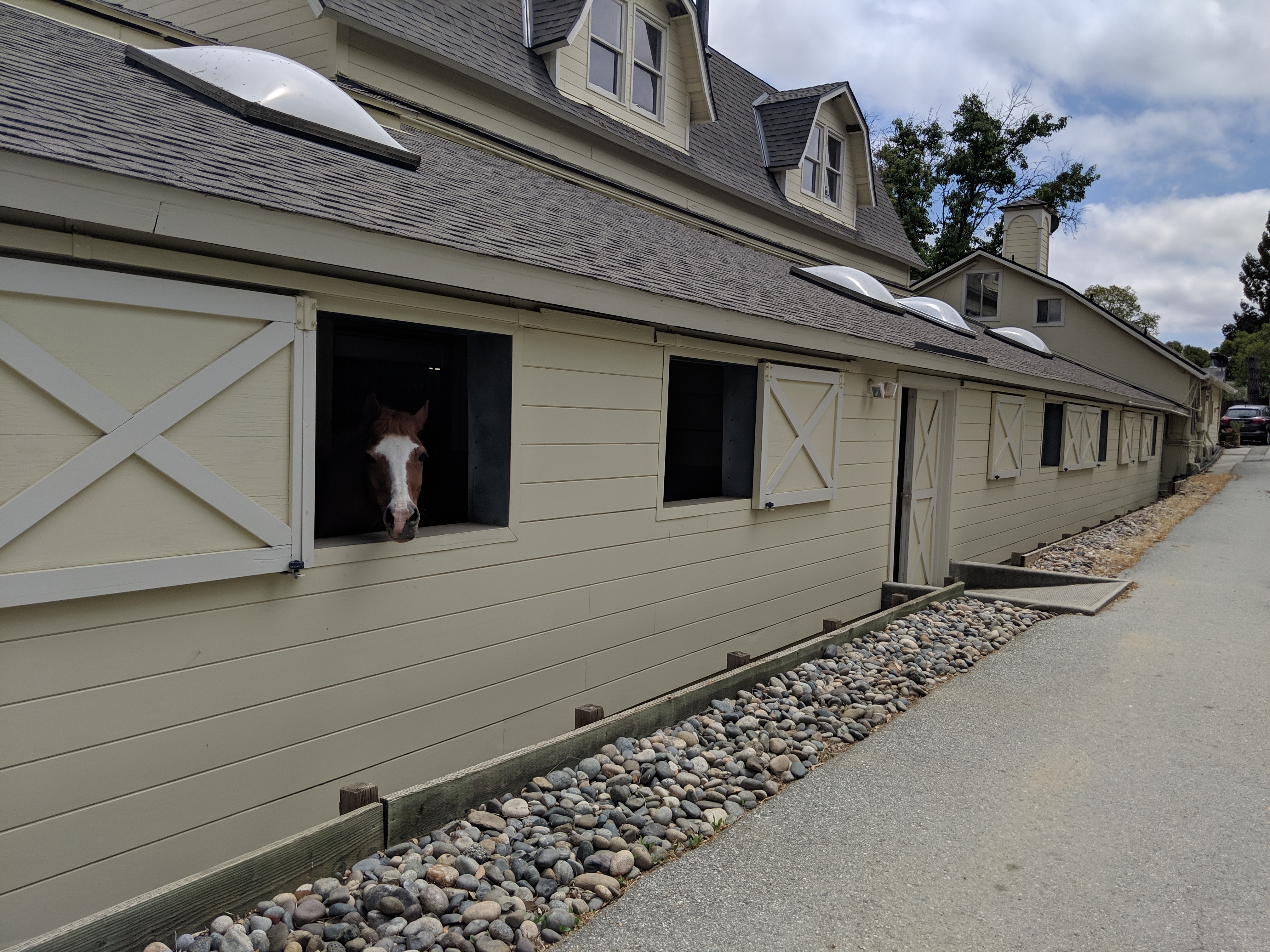
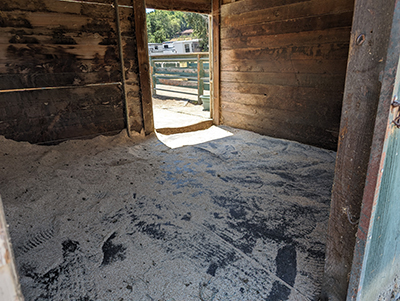
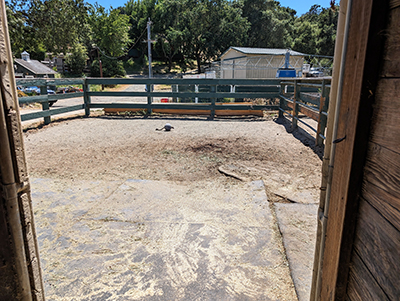
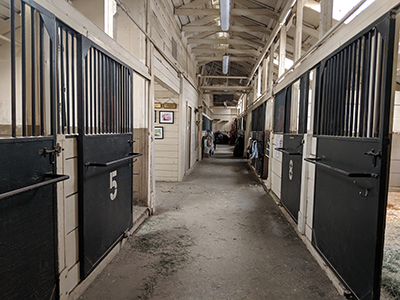
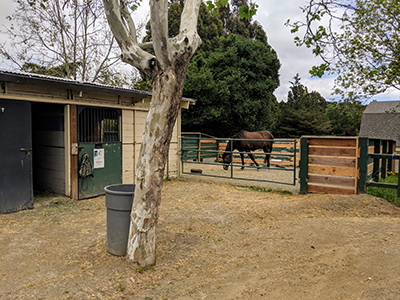
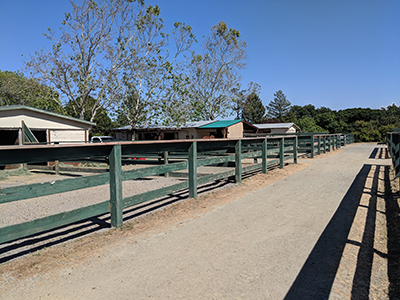
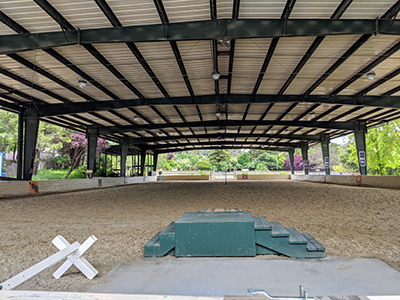
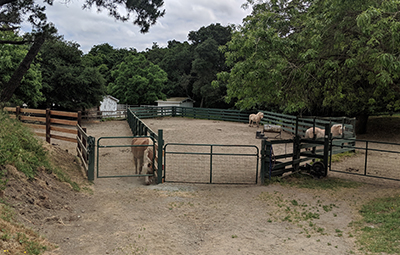
Are the organization's rules, restrictions and warnings (signage) conspicuously posted in easily accessible locations? Yes
Are the organization's emergency contacts, including veterinarian contact information, conspicuously posted in easily accessible locations? Yes
Are human and equine first aid kits easily accessible? Yes
Regarding all shelters where horses are housed including run-in sheds:
Do horses have assigned stalls in the barn/structure(s) or exclusively assigned shelter locations where they are separated from other horses with a barrier? Yes
How many hours per day, on average, are horses stalled or restricted to these sheltered exclusive shelter locations? 17+
How often are the stalls/shelters cleaned, i.e., kept in good repair and free of standing water, accumulated waste, sharp objects and debris? 6-7 Days a Week
Do all stalls/shelters allow horses to lie down, stand up and turn around and provide protection from inclement weather (wind, sleet, rain, snow and extreme temperatures)? Yes
Are stalls/shelters kept in good repair, with adequate ceiling height, and free of standing water, accumulated waste, sharp objects and debris? Yes
Are floors constructed and maintained for both good drainage and traction? Yes
Is there a ventilation and circulation system in place to allow free flow of air to control temperature, and humidity, and to prevent air stagnation? Yes
Is wiring inaccessible to horses and maintained for safety in all areas of facility? Yes
Are fire prevention/protection measures (fire alarms, extinguishers and sprinkler systems) maintained and in good working order? Yes
Is there adequate lighting to ensure safety in all areas of facility? Yes
How many hours per day, on average, are horses turned out:
Equines are out 1 to 3 hours per day
The following describes the pastures at this facility:
A dedicated staff person(s) is responsible for pasture management
All pastures are fenced to prevent escape or injury
Fencing checks, such as broken or missing planks, loose fence posts, exposed or loose nails, detached wires, etc., are done regularly
Pastures are rotated
Pastures have natural protection for equines (i.e., trees)
Pastures have man-made protection for equines (i.e., shelters)
This facility does not have pastures where equines can graze on pasture grass
This facility has a written plan in place for pasture management, which includes guidelines for seeding, fertilizing, irrigation, mowing, dragging, harrowing, manure removal, removal of debris, the control of poisonous plants, and a schedule for cleaning
Barbed wire is used for fencing
Electric fencing is used; electric wires or tape fence are visibly marked
The following describes the turnout areas other than pastures at this facility:
A dedicated staff person(s) is responsible for the maintenance of turnout areas
All turnout areas are fenced to prevent escape or injury
Fencing checks, such as broken or missing planks, loose fence posts, exposed or loose nails, detached wires, etc., are done regularly
This facility does not have turnout areas
This facility has a written plan in place for the maintenance of turnout areas, which includes a schedule for cleaning, manure removal, and dragging
Barbed wire is used for fencing
Electric fencing is used; electric wires or tape fence are visibly marked
Turnout areas have man-made protection for equines (i.e., shelters)
The following policies and procedures are in place at the facility to restrict public access and to keep horses safe:
The property owner, staff member or caretaker lives on the premises and ensures that public access is restricted and is responsible for the security of the facility and equines
There is a practice in place to monitor equines overnight
By Appointment Only signs are posted.
No Trespassing signs are posted
Hold Harmless signs are posted
Authorized Personnel Only signs are posted
Entrance gates are locked at night
Visitors are only permitted at specific times
Visitors are only permitted in specific areas
The property is fitted with motion lights
The property is fitted with a security system that is monitored internally by staff (or the property owner)
The perimeter of the property is fully fenced
A security guard is present at night
The property is fitted with a security system monitored by police or a professional service
Equine Care/Emergency Preparedness: National Center for Equine Facilitated Therapy (*Main) 2026 and 2025 This section is required.
Horse Health Care/Barn Management Records: What system is used to collect and store health/horse care records?
Notebook or equivalent (technology not utilized)
Onsite computer with onsite backup storage system
Onsite computer with cloud-based backup storage system
The organization utilizes its own system to maintain records
Our organization would use free cloud-based barn management software if available
The following items are consistent with our feed management plan and practices:
Equines are provided with individualized feeding plans, including supplements, according to the equine's age, breed/type, condition, size, work level and any health issues, consisting of nutritious food provided in sufficient quantity and access to adequate natural forage, or be fed daily, or as recommended by the organization's veterinarian
Feed plans are determined in consultation with a veterinarian
Supplement plans are determined in consultation with a veterinarian
Equines are fed grain in individual stalls
Staff and/or volunteers are trained in proper feed measurements and protocols and observed periodically to ensure they are feeding correctly
The feed chart is centrally located and updated as needed
The area(s) where hay, feed, grain, and supplements are stored are kept clean, free of debris and chemicals, and protected from weather and other animals in rodent-proof and mold-proof containers and grain bins
Feed, supplements and hay types are clearly labeled
Water sources, i.e., buckets, troughs, automatic waterers, etc. are kept clean, free of contaminants, debris and chemicals, protected from weather and other animals, and be positioned or affixed to minimize spillage.
Medications are kept in a secure area
Equines are fed grain in groups
Is clean, potable water available at all times for all equines? Yes
Hoof Care: How often is hoof care provided for each equine? Every 4-8 weeks and when an issue arises
Dental Care: How often is dental care provided for each equine? Annually and when an issue arises
Horse checks: How often are equines visually and physically checked by personnel at the facility? Every day or 6 days a week
Our organization has the following parasite and fly/insect control protocols in place, including remedies used to control flies and insects:
Our organization follows the parasite control guidelines of our veterinarian, including fecal testing and de-worming
Fly/Insect Control Remedies:
Fly Traps and Tapes
Premise Sprays/Insecticides
Fly Spray Repellent
Fly Masks
Fly Sheets
Fans
The following represent the biosecurity practices in place at facility:
Our organization follows the biosecurity guidelines of our veterinarian
Sick, affected and/or quarantined equines do not have contact with other equines or other animals
The organization has a written biosecurity plan
Staff are trained in best practices related to biosecurity
Volunteers are trained in best practices related to biosecurity
A specific individual is trained and assigned to care for sick, affected and/or quarantined equines
Sick, affected and/or quarantined equines are cared for last if the caretaker must also care for healthy equines
Restricted access signs are posted at primary points of access to sick, affected and/or quarantined equines
Hand sanitizers are available at all primary points of access to sick, affected and/or quarantined equines
Footbaths are available at all primary points of access to sick, affected and/or quarantined equines
Manure and bedding from sick, affected and/or quarantined equines is removed from the facility - not put in open air piles, and not spread on pastures
Quarantine areas, such as stalls, aisle ways, paddocks, and common areas, are cleaned (and needed, disinfected) after conclusion of the quarantine.
Trailers/vans used by sick, affected and/or quarantined equines are cleaned and disinfected after each use and cleaning takes place away from where equines are sheltered
Equipment used by sick, affected and/or quarantined equines is not shared
Equipment used by sick, affected and/or quarantined equines is cleaned of organic debris and disinfected after each use
Latex gloves, or equivalent gloves, are worn when working with sick, affected and/or quarantined equines
Equines are not quarantined on arrival.
The following represent the manure removal practices in place at facility:
Manure is stored in dumpster(s)
Manure is hauled, sold or given away
Our organization adheres to the manure management guidelines set by the state, local authorities, and/or our organization's veterinarian
Manure is piled in an area where equines are not located
Manure piles are covered
Manure piles are composted or spread on pastures
The following steps are taken to help staff and volunteers readily identify each horse on the property:
Equines are assigned the same exclusive stall/shelter location each day
Name plates are located on the stall/shelter location
Photos are located on the stall/shelter location
Equines wear halters with nametags
A notebook or binder with photos and information on each equine is easily accessible
A map/diagram is posted showing the location of each equine with equine names and photos
Equine photos and profiles are available on the website
Staff and volunteers are provided with an information packet with equine profiles, including photos and detailed descriptions
Staff/volunteers are provided training on conformation, markings, colors, and breeds
Team leaders work with new staff/volunteers until they are able to identify the equines
Our organization has the following policies and procedures in place pertaining to tack, apparel and equipment:
Saddles are shared
Saddle pads are shared
Blankets, sheets and turn out apparel are fitted and utilized for each equine appropriate to the equine's needs and the weather conditions
Blankets, sheets and turn out apparel are cleaned regularly as needed
Riding Tack is cleaned only when needed
Riding Tack is inspected for overall working condition before each use by trained personnel
Riding Tack is assessed for fit before each use by trained personnel
Riding Tack is assessed for fit by trained personnel when an equine's body condition changes
Riding Tack is assessed for fit by trained personnel when an equine's disposition changes
This facility enlists the services of a professional saddle fitter at least once a year
Assigned riding tack is clearly labeled
Riding Tack is stored in a climate-controlled location
Helmets are shared
Helmets are cleaned/disinfected after each use
Helmets are replaced after a fall
Helmets are replaced at least every five years.
All equines have specifically assigned apparel, equipment and tack (saddles/bridles if ridden) that is not shared
Bridles are shared
Bits are shared
Blankets are shared
Sheets are shared
Turnout apparel is shared
Halters are shared
Riding Tack is always cleaned after each use
Riding Tack is always cleaned at least weekly
No equines are ridden; saddles, bridles, etc. not applicable.
Emergency Preparedness: National Center for Equine Facilitated Therapy: *Main This section is required.
The following plans, policies, and procedures are in place at the facility to handle emergencies and address weather related issues, fire safety procedures, and/or any additional hazardous scenarios the facility could potentially experience:
Emergency procedures are posted prominently
The facility owns or has access to a generator
The facility maintains at least two weeks of hay, feed, shavings and medications
The facility collects and maintains medical information from staff, volunteers, and clients
The facility maintains appropriate liability and/or workers' compensation insurance
The organization has a written emergency preparedness/safety plan (EPP)
Local fire department and/or the state's emergency planning department procedures
Medical emergencies for clients, staff, and volunteers
Medical emergencies for equines
Evacuation plans
Power outages
Fire
Natural Disasters - thunderstorm, hurricanes, earthquakes, tornados, etc
Protocols to notify emergency personnel
Building/facility exit plans
Terrorist attacks
The facility follows the specific procedures to help PREVENT emergency situations:
Smoking is strictly prohibited
NO SMOKING signs are posted prominently
Permanent or temporary structures where equines are stalled are kept free of dust, cobwebs, trash, cleaning rags, and other flammable items
Aisles and doorways are kept clear
Hay is stored away from permanent or temporary structures where equines are stalled
Heaters with automatic shutoff settings are used
How often are the following checked or performed?
Fire Extinguishers are checked: Annually
Smoke detectors are checked: Annually
Fence lines are checked: Daily
Turnout Areas are checked: Daily
Sprinkler systems are checked: Annually
Fire drills are conducted: Annually
Review of safety protocols with staff are conducted: Annually
Review of safety protocols with volunteers are conducted: Annually
The Emergency Preparedness Plan is reviewed and updated: Annually
Equine Transportation: 6= Onsite: 3 (1 + 2) + Offsite: 3
2-horse van/trailer with truck:
1 Owned onsite 1 Access offsite;
3-horse van/trailer with truck:
1 Access onsite but not owned
4-horse van/trailer with truck:
1 Access onsite but not owned 1 Access offsite;
8-horse van/trailer with truck:
1 Access offsite;